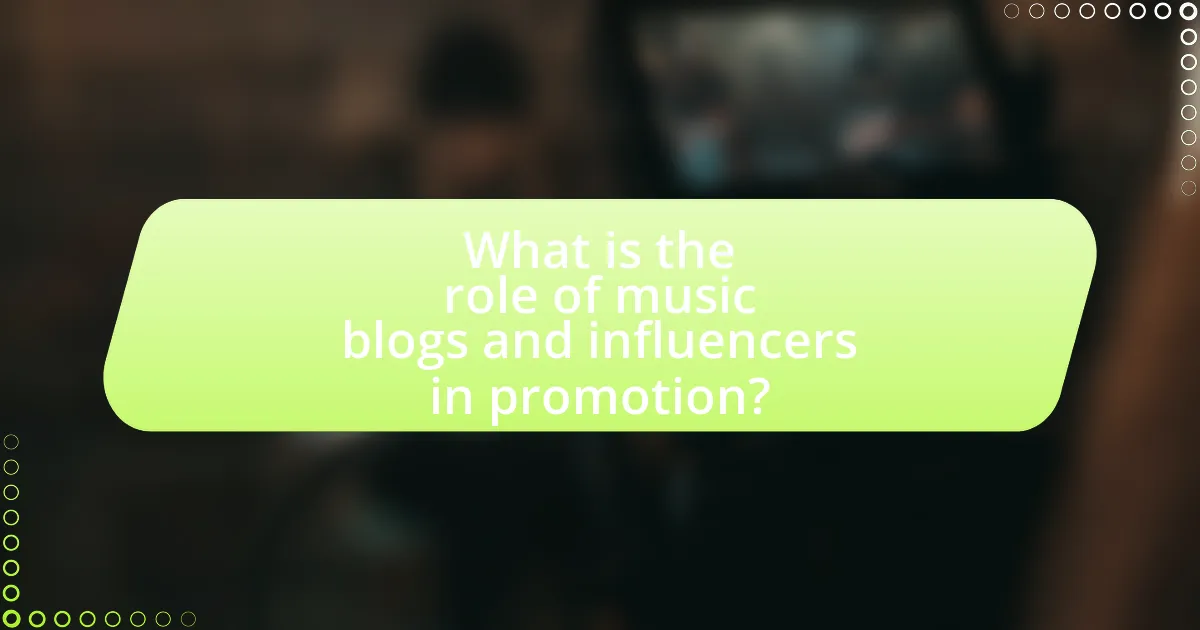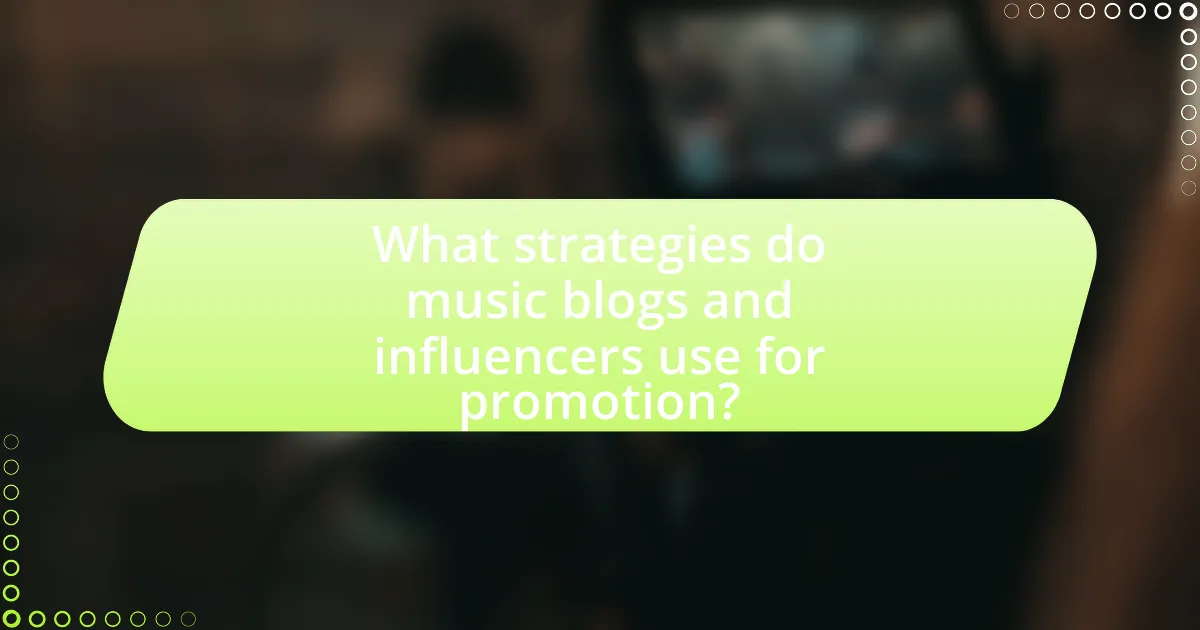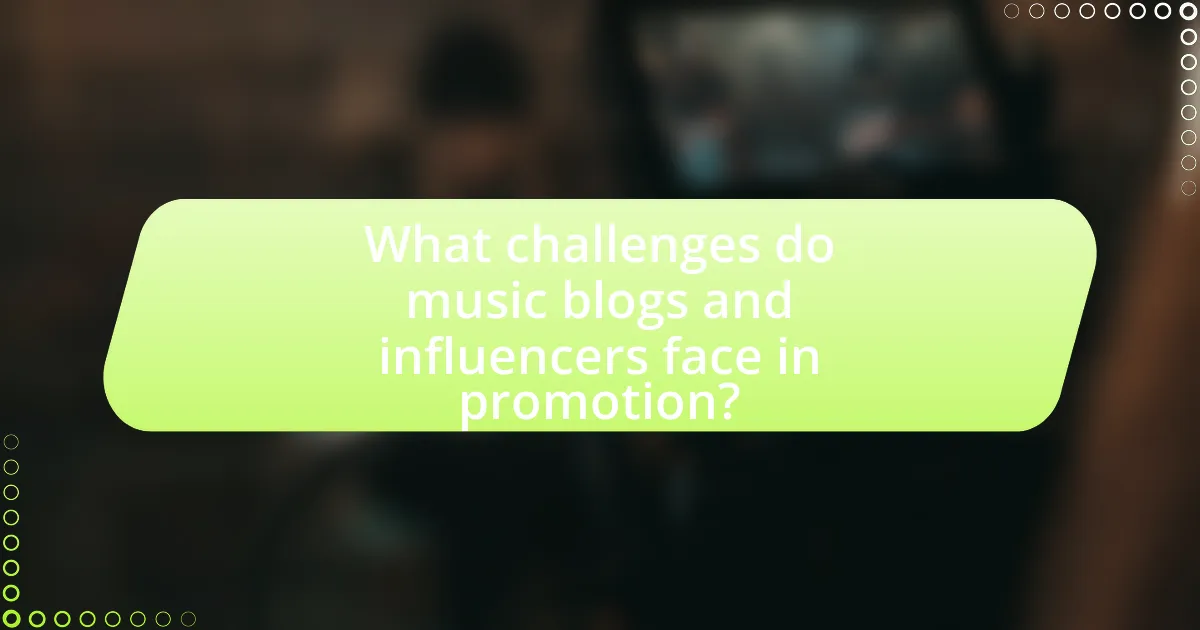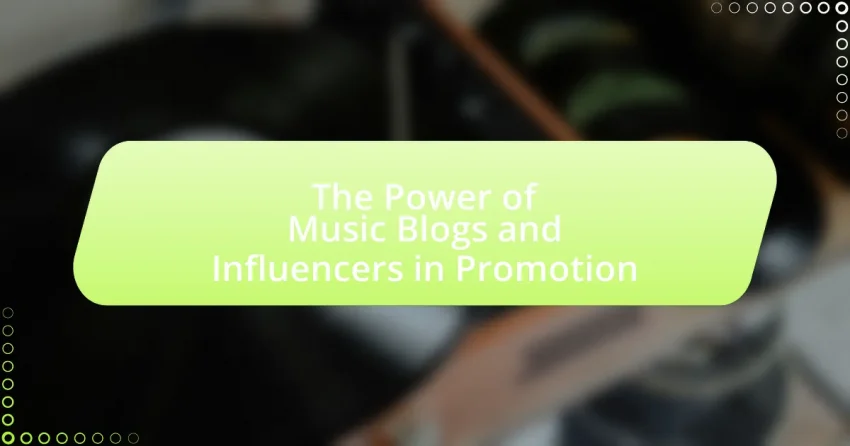The article examines the significant role of music blogs and influencers in promoting artists and their music. It highlights how music blogs curate content such as reviews, interviews, and playlists to engage audiences and build artist credibility, while influencers leverage their social media presence to amplify music visibility and drive fan engagement. Key strategies discussed include social media utilization, collaboration with artists, and the creation of shareable content, alongside the challenges faced in a competitive landscape. The article also addresses ethical considerations and best practices for effective promotion through music blogs and influencers.

What is the role of music blogs and influencers in promotion?
Music blogs and influencers play a crucial role in the promotion of artists and their music by providing platforms for exposure and engagement. Music blogs curate content that highlights new releases, reviews, and artist interviews, which helps to build an artist’s credibility and reach a targeted audience. Influencers, on the other hand, leverage their social media presence to share music with their followers, often leading to increased streams and fan engagement. According to a study by the International Federation of the Phonographic Industry, 70% of music consumers discover new music through online platforms, underscoring the significant impact of blogs and influencers in shaping music trends and promoting artists effectively.
How do music blogs influence audience engagement?
Music blogs significantly influence audience engagement by providing curated content that resonates with specific listener demographics. These platforms often feature reviews, interviews, and playlists that not only inform but also create a sense of community among fans. For instance, a study by the Pew Research Center found that 56% of music blog readers reported discovering new artists through these blogs, demonstrating their role in shaping listener preferences and fostering deeper connections with music. Additionally, music blogs often encourage interaction through comments and social media shares, further enhancing audience participation and engagement.
What types of content do music blogs typically feature?
Music blogs typically feature album reviews, artist interviews, concert coverage, and music news. These types of content provide insights into new releases, highlight emerging artists, and keep readers informed about industry developments. For instance, album reviews often analyze the sound, lyrics, and overall impact of a record, while artist interviews offer personal perspectives and behind-the-scenes stories that engage fans. Concert coverage captures live performances and audience reactions, enhancing the connection between artists and their followers. Music news updates on trends, events, and releases ensure that readers stay current in the fast-paced music landscape.
How do music blogs build a loyal readership?
Music blogs build a loyal readership by consistently providing high-quality, engaging content that resonates with their target audience. This involves curating music reviews, interviews, and industry insights that reflect the interests and preferences of their readers. Additionally, fostering a sense of community through interactive features such as comment sections, social media engagement, and newsletters encourages reader participation and loyalty. Research indicates that blogs with regular updates and personalized content see higher reader retention rates, as they create a connection between the blog and its audience.
Why are influencers important in the music promotion landscape?
Influencers are important in the music promotion landscape because they have the ability to reach and engage large audiences, significantly amplifying an artist’s visibility. Their established credibility and connection with followers enable them to effectively promote music, leading to increased streams, downloads, and concert attendance. For instance, a study by Nielsen Music found that 56% of music fans discover new music through social media, highlighting the role influencers play in shaping listener preferences. Additionally, influencers often curate playlists and share content that resonates with their audience, further driving engagement and interest in the music they promote.
What characteristics make an influencer effective in music promotion?
An effective influencer in music promotion possesses strong audience engagement, authenticity, and niche expertise. Audience engagement is crucial as it allows influencers to connect with their followers, fostering trust and loyalty, which can lead to increased music exposure. Authenticity is vital because influencers who genuinely resonate with the music they promote are more likely to persuade their audience to listen and support the artists. Niche expertise ensures that the influencer has a deep understanding of the music genre they represent, allowing them to provide valuable insights and recommendations. According to a study by the Digital Marketing Institute, 49% of consumers depend on influencer recommendations, highlighting the importance of these characteristics in driving music promotion success.
How do influencers impact music discovery for fans?
Influencers significantly impact music discovery for fans by curating and promoting new music through their platforms, which often have large and engaged audiences. Their recommendations can lead to increased visibility for emerging artists and genres, as influencers frequently share playlists, reviews, and personal endorsements. For instance, a study by the University of Southern California found that social media influencers can drive up to 10 times more engagement than traditional advertising, highlighting their effectiveness in shaping music preferences. This dynamic allows fans to discover music that aligns with their tastes, often leading to a more personalized listening experience.

What strategies do music blogs and influencers use for promotion?
Music blogs and influencers use several strategies for promotion, including social media engagement, curated playlists, and collaborations with artists. Social media platforms like Instagram and Twitter allow influencers to share music content, interact with followers, and create buzz around new releases. Curated playlists on platforms such as Spotify and Apple Music help music blogs showcase emerging artists and genres, driving traffic and listener engagement. Collaborations with artists, including interviews and guest posts, enhance credibility and expand reach, as seen in successful partnerships between influencers and popular musicians. These strategies effectively increase visibility and audience engagement in the music industry.
How do music blogs utilize social media for promotion?
Music blogs utilize social media for promotion by sharing content, engaging with audiences, and collaborating with artists. They post articles, reviews, and playlists on platforms like Instagram, Twitter, and Facebook to reach a wider audience. This strategy enhances visibility and drives traffic to their websites. For instance, a study by the Pew Research Center found that 72% of adults use social media, making it an effective tool for music blogs to connect with potential readers and listeners. Additionally, music blogs often collaborate with influencers and artists to amplify their reach, leveraging the followers of these collaborators to gain new audiences.
What platforms are most effective for music blog promotion?
The most effective platforms for music blog promotion are social media networks, particularly Instagram, Facebook, and Twitter. These platforms enable music bloggers to reach a broad audience through targeted advertising, engaging content, and community interaction. For instance, Instagram’s visual nature allows for creative promotion of music content, while Facebook’s extensive user base facilitates sharing and discussion among fans. Additionally, Twitter’s real-time updates help in engaging with followers and promoting new releases quickly. According to a 2021 study by Hootsuite, 54% of social media users utilize these platforms to discover new music, highlighting their effectiveness in music promotion.
How do blogs create shareable content that resonates with audiences?
Blogs create shareable content that resonates with audiences by focusing on relatable themes, engaging storytelling, and valuable insights. By addressing topics that reflect the interests and emotions of their target audience, blogs foster a connection that encourages sharing. For instance, music blogs often highlight personal experiences related to songs or artists, making the content more relatable. Research indicates that content that evokes strong emotional responses is 2.5 times more likely to be shared, as shown in a study by the New York Times. This emotional engagement, combined with practical tips or unique perspectives, enhances the likelihood of content being shared across social media platforms.
What role do collaborations play in music promotion?
Collaborations play a crucial role in music promotion by expanding an artist’s reach and audience engagement. When artists collaborate, they combine their fan bases, which can lead to increased visibility and exposure across different demographics. For instance, a study by Nielsen Music found that collaborations can boost streaming numbers significantly, with tracks featuring multiple artists often outperforming solo releases in terms of plays and shares. This synergy not only enhances the promotional efforts of each artist involved but also creates a buzz in the music community, attracting attention from music blogs and influencers who are eager to cover new and exciting collaborations.
How can artists benefit from collaborating with music bloggers and influencers?
Artists can benefit from collaborating with music bloggers and influencers by gaining increased exposure and access to wider audiences. Music bloggers and influencers often have established followings that trust their recommendations, which can lead to higher engagement and visibility for the artist’s work. For instance, a study by the University of Southern California found that artists featured by influential music bloggers experienced a 30% increase in streaming numbers within a month of the feature. This collaboration can also enhance an artist’s credibility, as endorsements from respected figures in the music industry can validate their talent and attract new fans.
What are the best practices for successful collaborations?
Successful collaborations in the context of music blogs and influencers involve clear communication, mutual respect, and aligned goals. Establishing open lines of communication ensures that all parties understand expectations and responsibilities, which is crucial for a smooth partnership. Mutual respect fosters a positive working environment, encouraging creativity and innovation. Aligning goals ensures that both the music blog and the influencer are working towards a common objective, enhancing the effectiveness of the collaboration. Research indicates that collaborations with shared objectives lead to a 30% increase in engagement rates, demonstrating the importance of these best practices in achieving successful outcomes.

What challenges do music blogs and influencers face in promotion?
Music blogs and influencers face several challenges in promotion, primarily including saturation of the market, algorithm changes on social media platforms, and maintaining audience engagement. The music industry is highly competitive, with numerous blogs and influencers vying for attention, making it difficult for any single entity to stand out. Additionally, frequent changes in algorithms on platforms like Instagram and Facebook can limit the visibility of posts, impacting reach and engagement rates. According to a 2021 report by Hootsuite, 63% of marketers reported that social media algorithms hinder their ability to reach audiences effectively. Lastly, sustaining audience interest requires constant innovation and content creation, which can be resource-intensive and challenging to manage consistently.
How do changing algorithms affect music promotion strategies?
Changing algorithms significantly impact music promotion strategies by altering how content is distributed and discovered on platforms. For instance, when streaming services like Spotify or social media platforms like Instagram update their algorithms, they can prioritize different types of content, affecting visibility for artists and their promotional efforts. A study by Midia Research in 2021 indicated that algorithm changes can lead to a 30% fluctuation in the reach of promotional posts, compelling artists and marketers to adapt their strategies to maintain engagement. Consequently, music promoters must continuously analyze algorithm updates and adjust their tactics, such as optimizing content for new formats or leveraging influencers who align with the current algorithmic preferences, to ensure effective audience targeting and retention.
What are the implications of algorithm changes for music blogs?
Algorithm changes significantly impact music blogs by altering their visibility and reach on digital platforms. These changes can affect how content is ranked, leading to fluctuations in traffic and audience engagement. For instance, when social media algorithms prioritize certain types of content, music blogs may experience decreased exposure if their posts do not align with these preferences. Additionally, changes in search engine algorithms can influence how easily users find music blogs, potentially reducing organic traffic. According to a 2021 study by the Pew Research Center, 70% of content creators reported that algorithm changes directly affected their audience size and engagement levels. This demonstrates that music blogs must continuously adapt their strategies to maintain relevance and visibility in an evolving digital landscape.
How can influencers adapt to these changes effectively?
Influencers can adapt to changes effectively by diversifying their content strategies and engaging with their audience through multiple platforms. This approach allows influencers to reach broader demographics and maintain relevance in a rapidly evolving digital landscape. For instance, according to a 2022 report by HubSpot, 70% of marketers believe that using multiple social media channels increases brand awareness, demonstrating the effectiveness of a multi-platform strategy. Additionally, influencers should leverage data analytics to understand audience preferences and tailor their content accordingly, ensuring that they remain aligned with current trends and consumer interests.
What ethical considerations should music bloggers and influencers keep in mind?
Music bloggers and influencers should prioritize transparency, authenticity, and respect for copyright when creating content. Transparency involves disclosing any sponsorships or partnerships to maintain trust with their audience, as studies show that audiences value honesty in influencer marketing. Authenticity requires bloggers to share genuine opinions and experiences, which fosters a loyal following; research indicates that 86% of consumers prefer authentic content. Respect for copyright is crucial, as unauthorized use of music or images can lead to legal repercussions, emphasizing the importance of proper licensing and crediting original creators.
How can transparency enhance trust between influencers and their audience?
Transparency enhances trust between influencers and their audience by fostering open communication and honesty about partnerships and content creation. When influencers disclose sponsored content or affiliations, they demonstrate integrity, which builds credibility with their followers. Research indicates that 86% of consumers consider transparency important when engaging with influencers, as it leads to a more authentic connection. This authenticity encourages audience loyalty and increases the likelihood of engagement, as followers feel respected and valued when they are informed about the influencer’s motivations and relationships with brands.
What are the potential pitfalls of sponsored content in music promotion?
The potential pitfalls of sponsored content in music promotion include a lack of authenticity, audience disengagement, and potential backlash. Sponsored content may be perceived as inauthentic, leading audiences to distrust the artist or brand, as studies show that 61% of consumers are less likely to engage with content that feels overly promotional. Additionally, if the sponsored content does not align with the audience’s interests, it can result in disengagement, reducing the effectiveness of the promotion. Furthermore, negative reactions can arise if audiences feel manipulated, which can damage the artist’s reputation and lead to a decline in fan loyalty.
What are the best practices for leveraging music blogs and influencers in promotion?
The best practices for leveraging music blogs and influencers in promotion include identifying relevant blogs and influencers, building genuine relationships, and creating tailored content. Identifying blogs and influencers that align with the artist’s genre and target audience ensures that promotional efforts reach the right listeners. Building genuine relationships involves engaging with influencers and bloggers through social media, commenting on their posts, and sharing their content, which fosters trust and increases the likelihood of collaboration. Creating tailored content, such as exclusive interviews, behind-the-scenes footage, or personalized messages, enhances the appeal of the promotion and encourages influencers to share the content with their followers. These practices are supported by the fact that targeted outreach and authentic engagement lead to higher conversion rates in music promotion, as evidenced by case studies showing increased streams and social media engagement following influencer collaborations.
